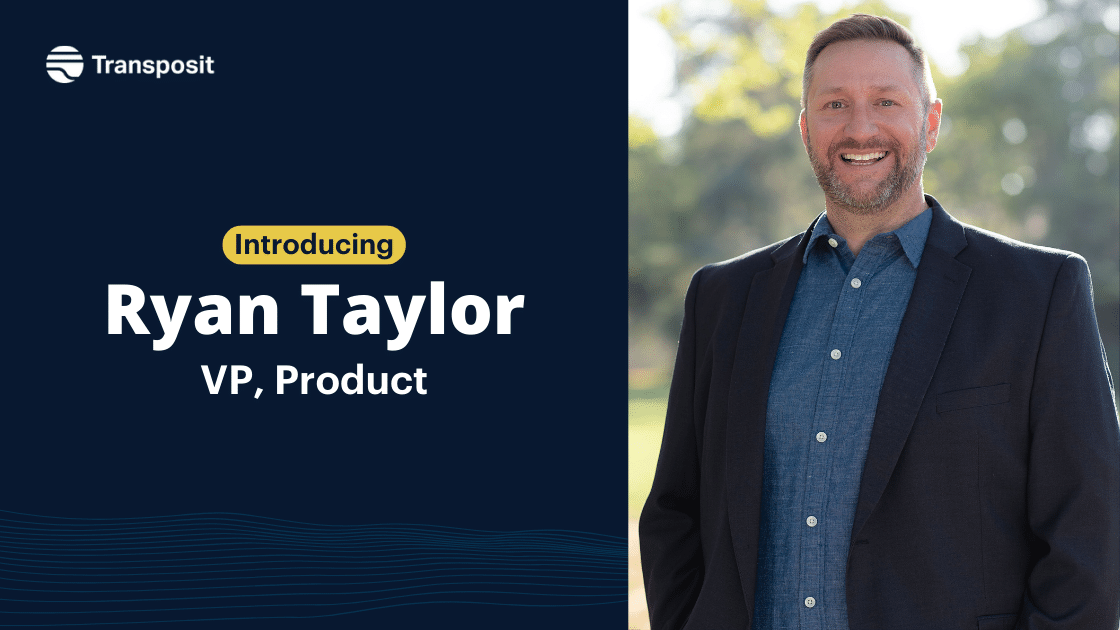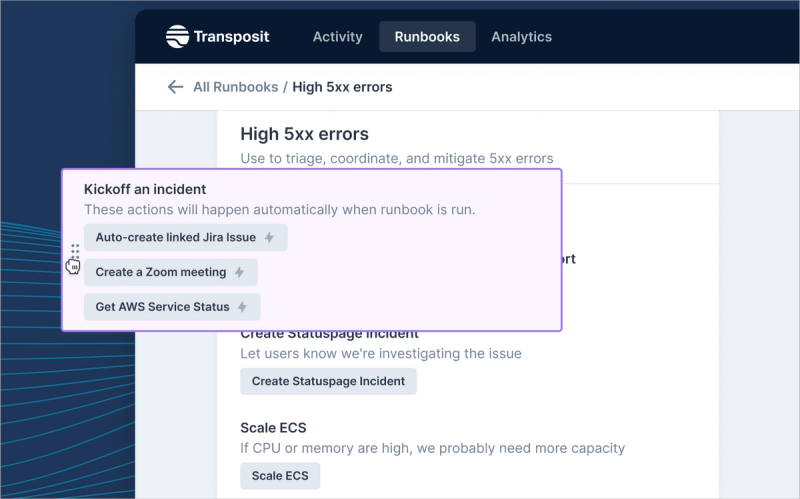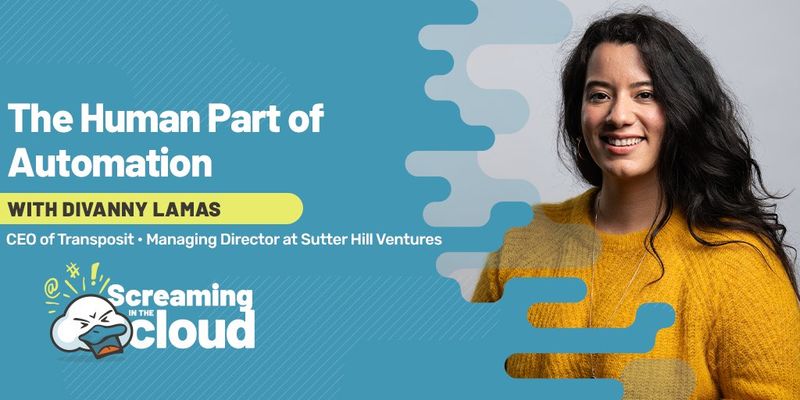Meet Transposit’s New VP of Product, Ryan Taylor
Our new VP shares his perspective on the future of operations and why joining Transposit is the best next step for his career

Earlier this week, we announced that Ryan Taylor joined Transposit’s leadership team as our VP of Product. Ryan has over 15 years of experience as a leader in Technical Operations with expertise in product development for internal services and SaaS products. He joins Transposit after almost five years at Hulu as Director of Production Operations. Before Hulu, Ryan led the global Intuit Operations and Application Operations teams for Quickbooks, TurboTax, and Mint.com.
His career started with ABC Financial when the business realized the advantages of software development. Contributing to a SaaS product early-on led him to pursue hands-on technical operations roles at multiple companies, which shaped the leader he is today. His teams built and maintained custom-coded solutions to overcome the kinds of problems Transposit is designed to solve.
I was excited to chat with Ryan about his career journey, his passions, and Transposit. Read on to learn more about him and the unique perspective he brings to our team.
Why did you decide to join Transposit? What excites you about the product and team?
When I spoke with Divanny about the product, we found immediate common ground. I dare say it was inevitable that we would work on these solutions together. The mission is simple: remove chaos to enable people, process, partnership, insights, integrations, engineers, operators, etc. I am excited to build a platform focused on operational maturity: structured data as a tool, incident analysis, automated recovery/diagnosis, enrichment, and correlation. Divanny, Tina, and I all believe many others will benefit from an orchestration tool that puts people at the center. The possibilities are endless.
My final decision to join Transposit was based on the following: if this product exists in the world, could I forgive myself if I didn’t have a hand in bringing it to market? The answer was and still is that I could not. Leading the product organization is an opportunity born of career experience and I am genuinely excited to do the work and thrilled to do it with this team.
What do you think differentiates Transposit from other technologies on the market? What does the future look like for SRE, DevOps, ITOps, and ITSM?
DevOps has dictated that ITIL methodology is no longer effective; however, the tenets of the framework still hold an audience in even the most technically advanced organizations. Organizations can realize faster response times, deeper analysis, and improvements through automation, structure, and measurement. SRE is ubiquitous, defined differently depending on the needs of an organization, and growing as a function. The benefits of a framework have proven to be valuable over time and shouldn’t move DevOps from the things that do work well.
We take a different ITIL/ITSM approach and provide a platform that moves organizations into the inevitable future. Transposit is approaching these problems with a platform that solves a problem regardless of maturity, scale, or skill set. If you are an engineer, you will have access to a robust set of tools that slot nicely into your current workflows. If you’re an operator, there will be low-code options that allow you to own the input and output of the work you already do, both diagnostic and recovery. Regardless of how it’s defined in your organization, SRE will find Transposit to meet the team’s skills on any level.
What are one or two of the most powerful lessons you learned in your role at Hulu that you will apply to your work at Transposit?
- People are the most essential part of the company and the product. Good culture builds great products and if I was suspect of that concept before, Hulu drove that home — great partnerships and great people build great products.
- Extreme focus on the customer — but with a broader version of what or who the customer is. The customer is not just the end-user — in operations, the customers may be the engineering team, the product organization, the business itself, partners both internal and external. At Hulu, a lot of the content is not theirs — it belongs to the studios, so they are customers too. Being a product leader now, my job is to be a cheerleader for all of those entities, both internal and external. The goal is to enable their jobs to be as easy as possible as they work in service of their own customers.
No one achieves success without some support along the way. Is there a particular person who you are grateful towards helping get you to where you are today? Do you have a story about someone or something that influenced you?
I could list many people — I’m someone who seeks mentorship in all relationships, so they often don’t know they are mentoring me.
Early in my career it was Paul Schaller, who was the president of ABC Financial. We were a billing company but also a software company. When customers chose to leave the company, he would make it as easy as possible — he would partner with them, fly technicians out, and make it really easy, even at the company’s expense. When I asked why he said, “if I make it easy for them to leave, I make it easy for them to come back.” It was customer service on top of customer service and a customer-first model that I hope to apply throughout my life. He had a significant influence on me —specifically his attitude, method for connecting with people, and customer focus.
Another is Kari Olson, the CTO at Front Porch. She demanded excellence — which drove her teams to greatness. Her leadership required us to look at a project, product, or even people management as more than just a problem searching for a solution. Instead, each stakeholder deserved the extra thought: appropriate communication, alignment across the organization, and defined success criteria. Working for Kari was both transformative and informative. In retrospect, her style signaled a future where female leadership is recognized as crucial for companies focused on innovation. I won’t pretend to have understood the challenges of her role then, but I can certainly appreciate what that experience must have been like now. The diversity of the Transposit team is one of the many factors that informed my decision to join the organization.
Do you have a favorite “Life Lesson Quote” you try to live by?
- “It’s nice to be important, but it’s more important to be nice.”
- “Force x distance = work.” So, you can put a lot of force into something but if you didn’t go anywhere, you actually got no work done. It’s the difference between ‘trying’ and ‘doing’."
- “No one works for me. Everyone works with me.”
What are some of your favorite things to do outside of work?
I do not lack hobbies or things that interest me:
- I’m an absolute sports nut and have the memorabilia and the season tickets for a few different professional sports in the area to prove it. Additionally, I’m particularly passionate about amateur softball and baseball. I run a couple of apps that help young adults who are looking to play college baseball or softball find opportunities to do so — it’s a recruiting assistant. I’m also deeply committed to helping grow women’s softball as an enabler. There are a number of products out there for baseball, but much less so for softball.
- I sit on the board for my local community college to provide support for the underserved and often ignored individuals attending community college. It’s a passion of mine to help establish monetary means for them to continue their education, since even at a much-reduced cost it is still a barrier for many. Education can be the cure for almost everything, whether it’s self-education or a more traditional form.
- I also travel quite a bit. I generally don’t do the nice hotels and resorts, I’d much prefer to take a tuk-tuk, grab street food, and immerse myself in the culture of the places I visit.
Any final words of advice you’d like to share, whether to future operations or product leaders or anyone else looking to advance in their career?
When forced with a decision, the one that makes you the most uncomfortable is probably the one you should explore the most. I’m not saying it’s always going to be the right decision, but it is definitely the one you should spend the most time on. Comfortability, ease, and coasting are the enemy of innovation and self-fulfillment. The obstacles or even failures you may encounter will enable learning that can be transformational in your life. For what it’s worth, this idea is what brought me to Transposit. This is a product and vision that doesn’t fully exist yet — it’s got a lot of moving pieces and a lot of potential, and so, it might have been the scariest option, but it was also the one that excited me most.
Want to hear more from Ryan? Check out our webinar A New Perspective on Operational Maturity.




